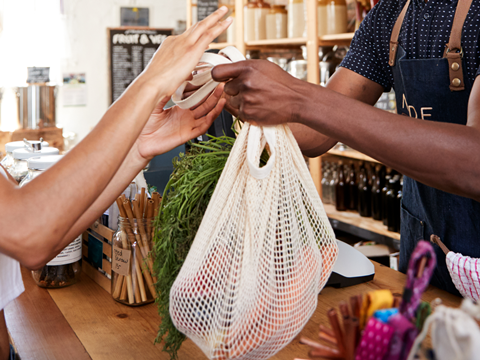
A series of studies led by Searious Business examines the barriers and levers for reusable packaging systems across five countries in Africa and North America – uplifting reusable shopping bags, refillable home care products, and refillable beverage bottles as the next solutions.
The End Plastic Pollution International Collaborative (EPPIC) is a public-private partnership hosted by the International Union for the Conservation of Nature (IUCN) and partners with Searious Business, The Aspen Institute, and The Ocean Foundation.
It describes reuse as a ‘crucial midstream intervention’ that keeps packaging and products in circulation for longer, thus preventing plastic waste. Yet the necessary infrastructure is ‘both complex and investment-intensive’, the summary explains.
In its effort to build ‘robust’ business models, set high sustainability standards, and pursue a just transition into circularity for plastics, the research seeks to underline the most viable reuse models in the selected countries – and, by sharing insights into their barriers and levers, equip stakeholders like policymakers, industry, MSMEs, NGOs, academia, and local communities with the necessary knowledge to build ‘strong’ and ‘scalable’ reuse infrastructure.
As part of the report, Searious Business identified seven ‘highly promising’ reuse and refill applications to identify potential barriers and leverage points in a pre-implementation analysis. It selected what it believed to be the most relevant reuse model for each application based on three essential elements.
One is a standardized packaging design that is functional, durable, and appealing to consumers without compromising on logistics or environmental benefits. Another is a ‘supportive’ system, which involves effective policies – ensuring that the reusable packaging delivers positive economic and environmental impacts. Thirdly, consumers must adopt reuse habits and engage with the reuse system in the long term.
A multi-stakeholder advisory group consulted such criteria as environmental impact, economic viability, technical feasibility, cultural acceptance, and existing initiatives to evaluate its top seven reuse applications. From here, Searious Business helped review the highest-scoring criteria and decide which to take forward.
Reusable shopping bags were the system of choice in Senegal. All the countries in question have placed bans on single-use plastic shopping bags, yet Searious Business notes its inconsistent implementation in Sub-Saharan Africa – making the transition into reusable alternatives ‘the simplest step forward’.
For Costa Rica and Ghana, the final choice was refillable beverage bottles in retail. Due to the adjustments required for bottlers and retailers alike, this is expected to be a challenging transition; yet the high rotation rates and large market demand for refillable food and drink containers is anticipated to reduce plastic waste ‘significantly’.
Meanwhile, refillable home care products were the top pick in Kenya and South Africa. Advisory groups highlight that consumers in these countries prefer refillable home care products over reuse systems for food and beverages due to concerns about their safety.
Socio-economic conditions like water scarcity and the general public’s emphasis on recycling over reuse are assumed to play a role, although the report acknowledges that there is no concrete evidence to support this.
Searious Business goes on to underline the ‘environmental limitations’ of replacing bulk packaging with reusable options – especially in South Africa, the report says, where bulk packaging is an established norm. Larger packaging runs the risk of slowing rotation rates, lowering the potential to reduce waste, and limiting accessibility with high upfront costs and the efforts required to influence consumer behaviour.
As such, the report argues that replacing smaller-format home and personal care products in retail and commercial channels (e.g. hospitality and cleaning) could unlock faster turnover and lead to more efficient reuse.
Reusable B2B transport packaging was not selected as a focus. Despite its ‘substantial potential for reuse globally’, Searious Business notes its ‘limited’ public visibility; to make its adoption more viable in the future, EPPIC plans to carry out awareness and education initiatives.
According to the report, the selection of one specific reuse system to develop does not negate the ‘considerable interest’ among the countries in question to combine their learnings. For example, Senegal and Ghana are said to value cross-learning from one another due to their similar national needs.
All the countries in question are believed to depend on similar success factors to successfully implement reuse systems: policy support and regulatory frameworks; financial incentives and investments; engagement and education; infrastructure and logistics; collaboration and partnerships; innovation and technology; and monitoring and evaluation.
Each is anticipated to pursue a reduction in plastic pollution and uplift more sustainable production and consumption by adopting these reuse schemes. Ongoing stakeholder engagement, policy support, and public awareness campaigns are also underlined as important factors in achieving the desired outcomes.
In the next few months, EPPIC intends to take ‘actionable steps’ towards building business cases and piloting the reuse schemes in each country. It seeks to build partnerships with the relevant manufacturers, retailers, and solution providers, and help promote reuse schemes with legislative support from government stakeholders.
Moreover, it will define every stakeholder’s role and responsibility in the business model; create case studies from global examples for ‘practical insights and inspiration’; and drive knowledge-sharing within EPPIC and beyond with peer-to-peer exchange.
Packaging Europe recently conducted its own report about reuse and refill, examining some of the industry-wide setbacks – including unclear definitions, legislative shortcomings, and a lack of coordination across the supply chain – and searching for a company’s best starting point.
Unilever also consulted systems currently operating in Africa and Asia to create a six-step plan for achieving successful reusable and refillable packaging models. This includes advice for driving consumer and retailer engagement in reuse schemes.
If you liked this story, you might also enjoy:
The ultimate guide to the Packaging and Packaging Waste Regulation in 2024
How are the top brands progressing on packaging sustainability?
Sustainable Innovation Report 2024: Current trends and future priorities
Everything you need to know about global plastic sustainability regulation













No comments yet